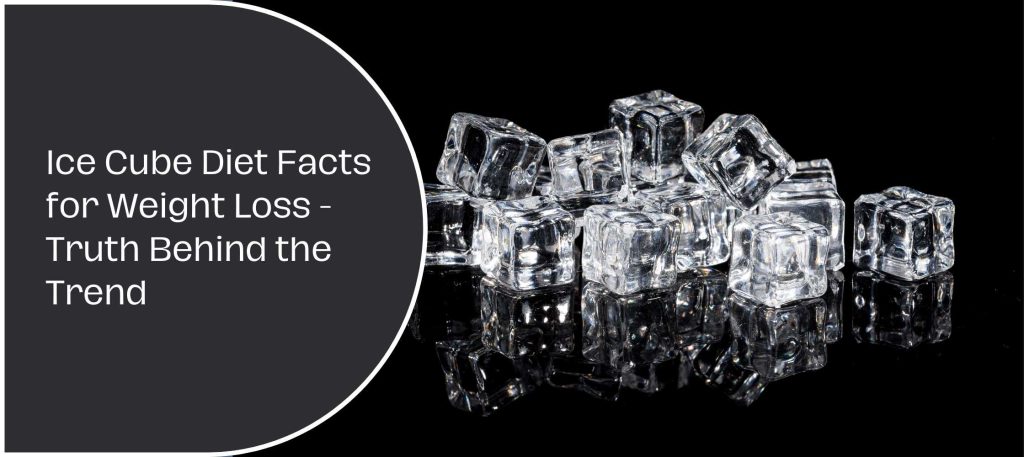|
Getting your Trinity Audio player ready...
|

Imagine you’re scrolling through social media and stumble upon a diet hack that promises significant weight loss without changing your diet or exercise routine—all you need to do is eat ice cubes. Sounds too good to be true, right? That’s because it probably is. But let’s dive into the icy waters of this claim and see what science and nutrition experts have to say.
The Ice Cube Diet – Myth or Reality?
The so-called “Ice Hack” diet has been making waves online, promoting a supplement called Alpilean, which is said to promote weight loss by raising the inner body temperature to speed up metabolism. This concept plays on the popular notion that consuming ice can force the body to burn more calories by warming the ice to body temperature.
However, the effectiveness of such methods for weight loss remains highly questionable. Experts argue that the fundamental principles of weight loss remain a balanced diet and exercise, not shortcuts like eating ice cubes.
The Science of Cold Exposure and Metabolism
The concept of thermogenesis, where the body generates heat, thereby burning calories, is a scientifically recognized process. This process includes basal metabolic rate, diet-induced thermogenesis, and adaptive thermogenesis—where cold exposure can indeed play a role. Cold therapy, from ancient practices to modern applications like the Ice Hack, involves exposing the body to cold temperatures to stimulate this calorie-burning process.
Yet, the idea that simply eating ice cubes can lead to significant weight loss stretches these scientific principles beyond their practical application. The reality is that the body’s mechanisms for weight loss are complex, involving not just temperature but also diet, physical activity, and overall lifestyle.
Health Implications of the Ice Cube Diet
While the idea of boosting metabolism through cold exposure is rooted in some elements of truth, the practical application of eating ice cubes for weight loss is fraught with potential health risks. Consuming large amounts of ice can lead to dental problems and potential digestive issues. Moreover, relying on a gimmick like the ice cube diet distracts from the importance of adopting a balanced and nutritious diet for sustainable health and weight management.
The allure of quick fixes can be tempting, but nutrition and health experts consistently emphasize the importance of a holistic approach to weight loss, involving healthy eating habits and regular physical activity, rather than looking for shortcuts.
Effective and Sustainable Weight Loss Strategies
As we turn away from the frosty allure of ice cubes as a weight-loss miracle, let’s focus on what truly matters in the journey toward health and wellness. Real, sustainable weight loss isn’t found in a cube of ice, a single food, or a quick-fix diet but in a lifestyle that embraces balance, nutrition, and activity.
Balanced Diet: Imagine a plate filled with vibrant colors from fruits and vegetables, lean proteins, whole grains, and healthy fats. This isn’t just pleasing to the eye; it’s the foundation of a nourishing diet that fuels your body and supports weight loss. I remember when I first swapped out my afternoon candy bar for a handful of almonds and an apple. The change was challenging at first, but the increase in my energy levels and overall mood was undeniable. It was a small step that led to bigger changes in my eating habits.
Regular Exercise: There’s no one-size-fits-all exercise plan, and the best workout is one you enjoy and can stick with over time. Whether it’s walking, cycling, yoga, or weight lifting, the key is consistency. My journey began with just 10 minutes of yoga each morning. It seemed insignificant at first, but those minutes added up, leading to longer sessions and a newfound love for movement.
Mindful Eating: This involves listening to your body’s hunger cues and eating with intention and attention. It was a game-changer for me to learn the difference between eating out of boredom and eating because my body genuinely needed nourishment.
Hydration: Often overlooked, drinking enough water is crucial for metabolism and helps reduce overeating. An interesting trick I learned was to drink a glass of water before meals; it helped me feel fuller faster and avoid overindulgence.
Sleep and Stress Management: Quality sleep and low stress levels are often the unsung heroes of weight loss. They play a crucial role in regulating hormones that control appetite and metabolism.
Conclusion
The journey through the icy myth of eating ice cubes for weight loss has led us to a warm conclusion: sustainable weight loss is achieved through a balanced lifestyle that incorporates nutritious food, regular physical activity, and mindful habits. While the allure of quick fixes and diet hacks can be tempting, they often distract from the foundational principles of health and wellness.
As we wrap up, I invite you to reflect on your own journey. Are you looking for a magic bullet, or are you ready to embrace the slow, rewarding path to lasting health? Remember, the best diet isn’t a temporary fix; it’s a way of life.
Let’s put the ice cube trays back in the freezer and focus on what truly matters—a balanced, nourishing lifestyle that supports our body’s natural processes. Here’s to health, happiness, and a life well-lived, one mindful choice at a time.
I’d love to hear about your experiences and thoughts on sustainable weight loss strategies. Have you ever tried a diet trend that seemed too good to be true? What lessons did you learn from it? Share your stories in the comments below, and let’s continue the conversation.
Remember, the path to health doesn’t start with a cold plunge but with a step toward balance, understanding, and self-care. Let’s embark on that journey together, one step at a time.
- Unlocking Els Pet: A Comprehensive Guide For New Purchasers - August 9, 2024
- Laser Hair Removal Costs in the US – Complete Guide - April 13, 2024
- Quinoa for Weight Loss – Effective Tips & Healthy Recipes - April 1, 2024
